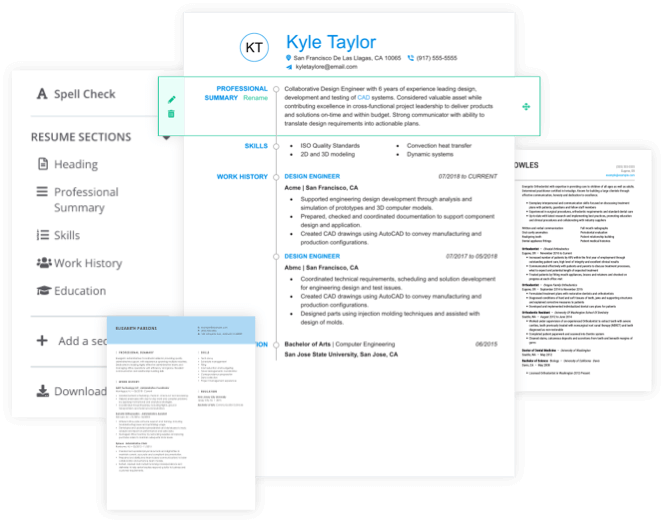- Featured in:

IT specialists, also known as information technology specialists, provide support for IT departments and end users in a number of organizations and industries. They ensure that computer hardware and software, as well as networks and servers, work consistently and correctly. IT specialists may install programs, configure networks and databases, and provide assistance to end users. They tend to focus on one or more areas of IT support, such as information security, database administration, or server maintenance.
This role requires extensive familiarity with IT processes and procedures, effective communication, departmental enhancement, and user support. IT specialists balance enterprise-wide support and enhancement with direct assistance for IT departments and users.
Need cover letter guidance? Add a cover letter to your resume using our cover letter formats how-to guide and add value to your resume.
One extra step to impress a manager: A growing number of hiring professionals read cover letters to determine whether they’ll interview a candidate or not. Use our cover letter templates to craft a complete application that lands you the interview.
IT Specialist Duties and Responsibilities
While an IT specialist’s role can depend largely on their specific organization and area of specialization, most of these core duties exist in any enterprise:
Install and Configure Networks
Many IT specialists work directly with an organization's servers and networks, performing setup, enhancement, and maintenance tasks. An IT specialist ensures that employees' work stations can successfully connect to networks and access business-critical data at all times. They may also configure network security settings and connect peripheral devices, like printers and scanners, that are used by multiple users.
Manage Databases
IT specialists build an organization's database architecture so that data is correctly stored and easily accessible. This can involve setting up data storage and retrieval protocols, adjusting permissions, and maintaining data security and integrity during migrations, backups, and day-to-day use. IT specialists use their expertise in database programs and languages to support enterprise-wide database access.
Provide User Support
IT specialists provide direct support to users across the organization. This can include helping set up hardware or software, diagnosing connectivity or data access problems, answering questions about hardware or software, and helping users access shared drives and devices. In some organizations, an IT specialist may also provide support to help desk personnel and technicians.
Manage Information Security
IT specialists maintain information security throughout the organization. They accomplish this goal in many ways, including monitoring access logs and building database security procedures. They may also set up antivirus programs at work stations, develop policies for email security, and perform periodic data audits and backups to prevent information loss and unauthorized access.
Troubleshoot Systems and Hardware
IT specialists also support the IT department and their organizations by troubleshooting systems and hardware, particularly after server migration or an organization-wide update. The IT specialist identifies issues with new hardware or software and works with users or on the back end of servers to quickly resolve those issues and prevent delays. The IT specialist may also prepare reports on hardware and software issues as part of this role.
IT Specialist Skills and Qualifications
IT specialists support IT departments and enterprises by installing, configuring, and maintaining databases, servers, and software. Companies typically hire IT specialists with at least a bachelor’s degree in a related field, along with the following skills:
- Hardware and software configuration - IT specialists need a great deal of knowledge about hardware and software configuration for servers, networks, computers, and peripherals
- Information security - this role requires extensive familiarity with information security practices and procedures to protect organization data from intrusion or corruption
- Problem-solving skills - IT specialists troubleshoot networks, computers, and devices, so they're excellent creative and technical problem-solvers
- Communication skills - effective written and verbal communication skills are vital in this role, since IT specialists work directly with users and IT department personnel
- Time management - an IT specialist easily moves between duties and responsibilities to effectively prioritize and manage their own schedules
Tools of the Trade
IT specialists usually work in offices and use standard office equipment and software, as well as the following specialized programs:
Server software (Windows or Linux)
Database management software (MySQL, Microsoft Access)
IT Specialist Education and Training
IT specialists need at least a high school diploma, although most have a bachelor’s degree in a field such as computer science. IT specialists possess extensive experience in IT support roles, particularly in their areas of focus, and many complete professional certification programs to enhance their job opportunities. There are many opportunities for on-the-job training in this role, especially since organizations have different structures and IT needs. IT specialists with at least a bachelor’s degree can improve their prospects of moving into a more senior position in the IT department.
IT Specialist Salary and Outlook
According to the Bureau of Labor Statistics (BLS), computer support specialists (including IT specialists) earn a median annual salary of $52,160 per year. The BLS splits its data for this role into two categories: computer network support specialists, who earn a median annual salary of $62,670, and computer user support specialists, who earn $49,390 annually. Because of the specialized nature of their work, salaries for IT specialists are likely toward the higher end of this range.
The BLS projects employment growth of 11 percent through 2026 as companies increasingly rely on computer networks and IT departments.

Helpful Resources
If you’re interested in a career as an IT specialist, we found a number of resources on the web for further reading and information:
Association of Information Technology Professionals
AITP offers IT professionals opportunities to connect, access continuing education materials, and keep up with industry developments
Getting Started in the Information Technology Field: With or Without a Technical Degree
read this book to learn how to begin working as an IT specialist and advance your career at any level
"IT Certifications 101: The Why, What, and How of IT Certifications"
certifications can help IT specialists advance their careers and open up employment opportunities through specialization
Information Technology Essentials: Basic Foundations for Information Technology Professionals
author Eric Frick covers basic IT concepts and best practices that can help IT specialists succeed
IT Specialist Resume Help
Explore these related job titles from our database of hundreds of thousands of expert-approved resume samples:




